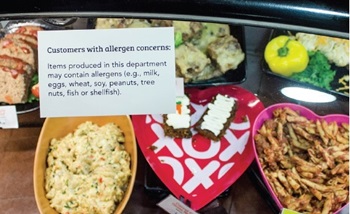By Adam Friedlander, MS, CFS, Manager, Food Safety and Technical Services, FMI
 For many years now, undeclared allergens have been the leading cause of food recalls in the United States. With one month remaining in 2020, this continues to hold true with 13 out of 26 U.S. Department of Agriculture (USDA) food recalls caused by undeclared or misbranded allergens. Meanwhile, of the 338 U.S. Food and Drug Administration (FDA) recall press releases that FMI has tracked this year[1], 177 have been caused by a variety of errors associated with allergens. Many of these recalls are due to labeling errors, such as the omission of allergens on product packages and using incorrect labels on product packages.
For many years now, undeclared allergens have been the leading cause of food recalls in the United States. With one month remaining in 2020, this continues to hold true with 13 out of 26 U.S. Department of Agriculture (USDA) food recalls caused by undeclared or misbranded allergens. Meanwhile, of the 338 U.S. Food and Drug Administration (FDA) recall press releases that FMI has tracked this year[1], 177 have been caused by a variety of errors associated with allergens. Many of these recalls are due to labeling errors, such as the omission of allergens on product packages and using incorrect labels on product packages.
Having accurate allergen information is critical to the estimated 32 million people in the United States who suffer from food allergies. According to Food Allergy Research and Education (FARE), each year over 200,000 Americans require emergency medical care due to allergic reactions caused by food. Within the last decade, the prevalence of reported food allergies has significantly increased, with an estimated 8% of children and 11% of adults impacted by food allergies. The symptoms and severity of food allergy reactions can vary, ranging from a mild response (such as itchy, tingling tongue) to life-threatening anaphylaxis.
The retail food industry plays a significant role in assuring a safe food supply for the public. Individuals with food allergies rely on the information provided via product label or signage when making their purchasing decisions. Therefore, when it comes to food allergens, accurate information and effective communication is the key to allergen management at retail.
An accurate label is not only critical to informing the consumer of the contents of the item, but it is also a regulatory requirement. Under the Food Allergen Labeling and Consumer Protection Act of 2004 (FALCPA), packaged foods are required to comply with federal allergen labeling requirements. Any packaged food containing one of the eight major food allergens (e.g., milk, egg, wheat, peanuts, soybeans, tree nuts, fish and crustacean shellfish), or containing protein derived from the eight major allergens must be declared on the food label.
Below are some key areas of an effective allergen management program to reduce food allergen risk:
- Safe product handling; minimizing cross-contact during preparation and service.
- Frequent handwashing, especially when switching tasks to work with foods that have different allergen profiles.
- Review and verify ingredient sourcing.
- Ensure ingredient and recipes match the product specifications.
- Implement best practices for cleaning and sanitation of allergens.
- Establish corrective actions (i.e., cleanup program in the event of a spill containing one or more allergens).
- Letter of guarantee from each supplier of a finished product, component ingredient or raw material. This letter must state that [the supplier] will provide advance notification of any formulation change. The retailer should initiate appropriate follow-up with suppliers to assure compliance.
- Ensure standard recipes are followed at store level. No ingredient substitution should be made without prior authorization from management.
- Verify the accuracy of the ingredients that are programmed into the scale systems, shelf labels or identification tags that provide ingredient information to consumers.
- Verify scale hardware memory capacity produces accurate ingredient printouts.
- Establish a process to verify the product is properly identified, and the correct label or sign is placed on the product prior to sale.
- Ensure labeling is accurate and consistent across all platforms— ecommerce, click and collect, delivery, meal kits and brick and mortar.
- Implement employee training program on food allergy awareness.
To increase awareness about the major allergens by retail food employees, FMI partnered with the International Food Protection Training Institute (IFPTI) to deliver a retail-specific allergen awareness training course. This course supports our members’ efforts to meet regulatory requirements and equip associates with the information and tools necessary to protect customers and individuals with food allergies.
Despite the rise in the number of people living with food allergies and the frequency of allergen related recalls, food retailers and product suppliers remain on the frontline of food safety. FMI will continue to advocate, collaborate, and educate the food industry to strengthen our role in assuring a safe food supply for shoppers across the country.
Product Recall Guidance for Retailers
FMI Allergen Resource Document
IFPTI Allergen Awareness Training for Retailers
For more information, please visit https://www.fmi.org/safemark/.
[1] The recall data included in this blog is an estimate and is based on information that USDA and FDA makes publicly available. A full list of recalls, market withdrawals, and safety alerts can be found at https://www.fsis.usda.gov/wps/portal/fsis/topics/recalls-and-public-health-alerts/current-recalls-and-alerts and https://www.fda.gov/safety/recalls-market-withdrawals-safety-alerts


 Industry Topics address your specific area of expertise with resources, reports, events and more.
Industry Topics address your specific area of expertise with resources, reports, events and more.
 Our Research covers consumer behavior and retail operation benchmarks so you can make informed business decisions.
Our Research covers consumer behavior and retail operation benchmarks so you can make informed business decisions.
 Events and Education including online and in-person help you advance your food retail career.
Events and Education including online and in-person help you advance your food retail career.
 Food Safety training, resources and guidance that help you create a company food safety culture.
Food Safety training, resources and guidance that help you create a company food safety culture.
 Government Affairs work — federal and state — on the latest food industry policy, regulatory and legislative issues.
Government Affairs work — federal and state — on the latest food industry policy, regulatory and legislative issues.
 Get Involved. From industry awards to newsletters and committees, these resources help you take advantage of your membership.
Get Involved. From industry awards to newsletters and committees, these resources help you take advantage of your membership.
 Best practices, guidance documents, infographics, signage and more for the food industry on the COVID-19 pandemic.
Best practices, guidance documents, infographics, signage and more for the food industry on the COVID-19 pandemic.
